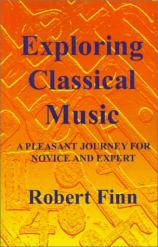Exploring Classical Music: A Pleasant Journey for Novice and Expert
Review
Exploring Classical Music: A Pleasant Journey for Novice and Expert
Robert Finn, longtime classical music critic for the Cleveland
Plain Dealer, attempted to find comfortable middle ground
between two classes of music lovers in EXPLORING CLASSICAL MUSIC: A
Pleasant Journey for Novice and Expert. Finn's goal was to write a
series of essays about composers and various issues of the music
world that would be beneficial to a person seeking a quality
introduction to classical music, while still providing plenty of
interest for life–long students of the music. He does,
however, suggest that his primary goal was to reach the novice
music listener.
"The reader I have most in mind is someone, perhaps, just beginning
to take an interest in classical music, but finding the whole
subject rather off–putting, even frightening," Finn writes in
the preface. "Such a person finds the technical terminology
daunting, the habitual use of foreign language phrases
discouraging, the whole enterprise surrounded by an air of
exclusivity and mystery."
Finn does much to set such a reader at ease, promising a
jargon–free look at composers and music that rank among his
personal favorites. This focus on his personal taste is perhaps the
book's greatest strength, because Finn makes it very clear that his
preferences should not be confused with dictates of some universal
authority. Indeed, he is often at odds with many of his fellow
critics and is a great champion of the listener's right to choose
for him or herself whatever music is pleasing.
On the whole, however, Finn fails to accomplish his primary goal.
Despite his promises to avoid jargon, he still tends to write
sentences like this one about a piece by Bela Bartok: "It opens
with a slow and sinuous orchestral fugue marked andante tranquillo
based on a highly chromatic theme that moves within a narrow pitch
range and is stated at the outset by the violas."
A true musical novice might have several questions about that
sentence: What's a fugue? What does andante tranquillo mean? What
is a highly chromatic theme? In what sense does "highly" enhance
the meaning of "chromatic?" What is a pitch range?
Finn often leaves his purported audience to struggle with such
questions. To make matters worse, the phrase "of course" appears
with maddening frequency throughout the text, and each time it
does, it appears that he has forgotten that for a true novice there
are no easy certainties that can be tossed off so lightly.
A bias against recordings also weakens the book. In a chapter
entitled "Pros and Cons about Recordings," Finn details his
objections to recordings, many of which, it must be admitted, have
some validity. For example, he suggests that the prevalence of
classical music (and indeed all music) recordings has allowed music
to become a background noise rather than a serious art worthy of
serious attention. Also, he argues persuasively that the static
nature of recordings robs listeners of the joys of hearing a piece
live and of the surprises of interpretation that are sometimes
heard on the concert stage.
Finn's admitted bias against recordings has led him to write a text
about music in which he makes almost no suggestions about where a
novice might turn to find a good recorded performance. Instead, he
rattles off lists of pieces, often suggesting that they have become
so ubiquitous that everyone knows them. A simple comment such as,
"I greatly enjoy the St. Louis Symphony's recording of…"
would be of great help to the new fan of classical music.
Despite these shortcomings, however, Finn's enthusiasm for his
subject is refreshing, as is his relaxed tone that, for the most
part, avoids high–brow language. Also, he offers listeners
sound advice for coming to grips with modern developments in music,
suggesting that a grounding in musical history helps prepare the
listener for more contemporary compositions.
"Part of the problem that audiences today have with truly 'new'
music is simply that they try to make the leap all at once from,
say, Mahler and Strauss (though for some to be sure, it goes
further back, to Brahms and Schumann) to the most modern
experimental pieces," he writes. "It cannot be done, just as you
cannot leap across a mile–wide river at one bound; you need
stepping–stones, intermediate way stations where you can see
both where you have been and where you are headed."
EXPLORING CLASSIC MUSIC itself may best be seen as a stepping stone
a few steps further along in a musical education than Finn may have
intended.
Reviewed by Rob Cline (rjbcline@aol.com) on January 21, 2011
Exploring Classical Music: A Pleasant Journey for Novice and Expert
- Publication Date: October 1, 2000
- Genres: Nonfiction
- Paperback: 204 pages
- Publisher: Superior Books
- ISBN-10: 1931055114
- ISBN-13: 9781931055116



